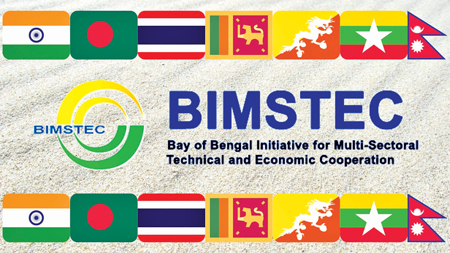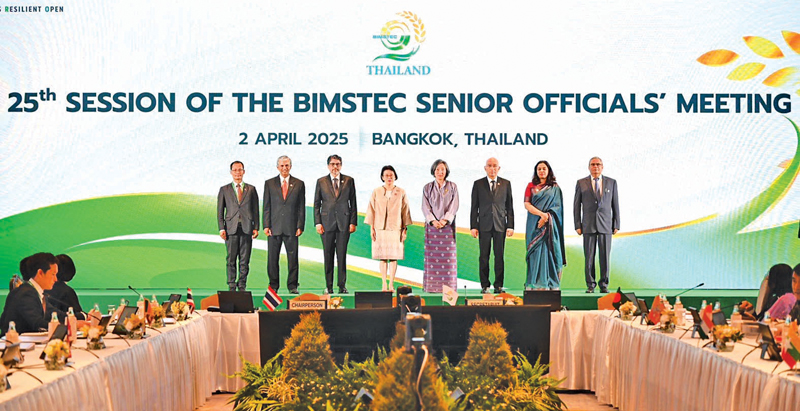On April 4, leaders from the seven countries surrounding the Bay of Bengal converged in Bangkok to chart a common future amid dramatic shifts in the global geopolitical landscape.
 This 6th Summit of the Bay of Bengal Initiative for Multi-Sectoral Technical and Economic Cooperation (BIMSTEC) also marks Prime Minister Paetongtarn Shinawatra’s first time chairing a regional gathering since taking office last August.
This 6th Summit of the Bay of Bengal Initiative for Multi-Sectoral Technical and Economic Cooperation (BIMSTEC) also marks Prime Minister Paetongtarn Shinawatra’s first time chairing a regional gathering since taking office last August.
The summit has the potential to position BIMSTEC as a rising force in the Global South, especially after the catastrophic disruption triggered by President Donald Trump’s return. The world order in place since the end of World War II is being altered by his America First approach.
The postponement of the summit from its original date of November 30 last year was a blessing in disguise. Over the past four months, the geopolitical environment has turned upside down, giving BIMSTEC leaders a fresh opportunity to evaluate emerging regional and international trends and implications. Plenty of bilateral meetings among the members are expected.
Attendees
BIMSTEC is a unique bloc because it includes the world’s largest democracy, India, along with four other South Asian countries — Bangladesh, Sri Lanka, Bhutan, and Nepal — and two ASEAN members, Thailand and Myanmar. Nay Pyi Taw is at the other end of the pendulum as the most brutal and oppressive regime.
Indian Prime Minister Narendra Modi is leading the Indian delegation.
Others attending include Sri Lankan Prime Minister Dr. Harini Amarasuriya, Nepal’s Prime Minister KP Sharma Oli, Bhutanese Prime Minister Tshering Tobgay, and Bangladeshi Chief Adviser Muhammad Yunus. Myanmar’s military leader, Senior General Min Aung Hlaing, has been invited to join the summit. This would be his first visit to Thailand since the February 2021 coup.
After a long hiatus, the BIMSTEC foreign ministers held an informal retreat in Bangkok last July. Following this meeting, they agreed to meet more frequently, at least three times a year, to update and strengthen their relationships.
Common interests
As the current BIMSTEC chair, Thailand aims to revitalise the forum as part of its “Look West” policy, first announced in 1997. Truth be told, the forum has now become one of Myanmar’s handful of regional engagement platforms, given its international isolation. Since the coup, the junta leader has been barred from all ASEAN meetings; only non-political officials are allowed.
Indian Foreign Minister Dr. S. Jaishankar said the Bangkok retreat has strengthened resilience and coordination among BIMSTEC members, particularly in food, health, and energy security, technology cooperation and best practice sharing to lift economic growth.
The bloc’s members are also on the same page over the need for crisis response mechanisms, digital payment systems, trade settlements, cyber security cooperation, and efforts to combat transnational crime.
 Sri Lanka, Bangladesh, Nepal, and Myanmar are also grappling with domestic economic and political challenges, as well as Climate Change, rising sea levels, Green Transition, and security issues.
Sri Lanka, Bangladesh, Nepal, and Myanmar are also grappling with domestic economic and political challenges, as well as Climate Change, rising sea levels, Green Transition, and security issues.
Granted the current global condition and unpredictability, the Bay of Bengal is no longer a geopolitical backwater. A quarter of the world’s traded goods transit through its waters annually. Nearly 1.5 billion people — about 22 percent of the global population — live in BIMSTEC countries, which collectively generate a GDP of US$ 2.7 trillion. From 2012 to 2016, these countries recorded GDP growth rates between 3.4 percent and 7.5 percent.
To ensure relevance and vision, a BIMSTEC Eminent Persons Group was formed to draft a strategic roadmap. Thailand has prepared the “BIMSTEC Bangkok Vision 2030”, to be adopted at the Summit. The vision aims to create a prosperous, resilient and open BIMSTEC — coined as “Pro-BIMSTEC”.
Thailand’s role
Drawing on Thailand’s experience of hosting Asia Pacific Economic Cooperation (APEC) summits, the Bangkok Vision emphasises post-pandemic recovery, poverty eradication, trade and investment growth, and environmental protection. A resilient Bay of Bengal will require robust human security networks, while an open BIMSTEC should invite broader stakeholder participation.
Thailand’s agenda also zeroes in on connectivity. Thai Foreign Affairs Minister Maris Sangiampongsa recently held a bilateral meeting with his Indian counterpart in New Delhi. Among the bilateral issues discussed was the long-delayed India-Myanmar-Thailand Trilateral Highway (IMTTH), a flagship initiative that Bangkok and Delhi hope will accelerate its completion and extend access to Bangladesh. At the summit, a maritime transport cooperation framework was to be signed.
Thailand’s renewed push in the Bay of Bengal reflects a global trend that involves mini-lateralism. As the Great Powers pursue zero-sum strategies, smaller and middle powers are banding together to protect their interests and existing regional supply chains. More than officials would like to admit, BIMSTEC has already emerged as one of the viable alternative platforms in a polarised world.
For Thailand, BIMSTEC is also an opportunity to deepen ties with India and South Asia without jeopardising its ties with other major powers. Cultural and historical affinities between Thailand and India facilitate closer cooperation in all areas, from trade to tourism.
With its extensive Andaman Sea coastline, Thailand is vulnerable to maritime threats such as irregular migration, piracy and cyber scams. At the summit, the BIMSTEC maritime cooperation agreement was adopted to promote the stability of the Bay of Bengal area.
Thailand hopes BIMSTEC’s rejuvenation will uplift the bloc’s international profile and strengthen its collective voice in the Global South. For Prime Minister Paetongtarn Shinawatra, the stakes are very high and personal as it is a rare opportunity to show her mettle and prove her critics wrong.
The writer is a senior journalist covering international affairs for the Bangkok Post.

BIMSTEC Senior Officials’ Meeting







